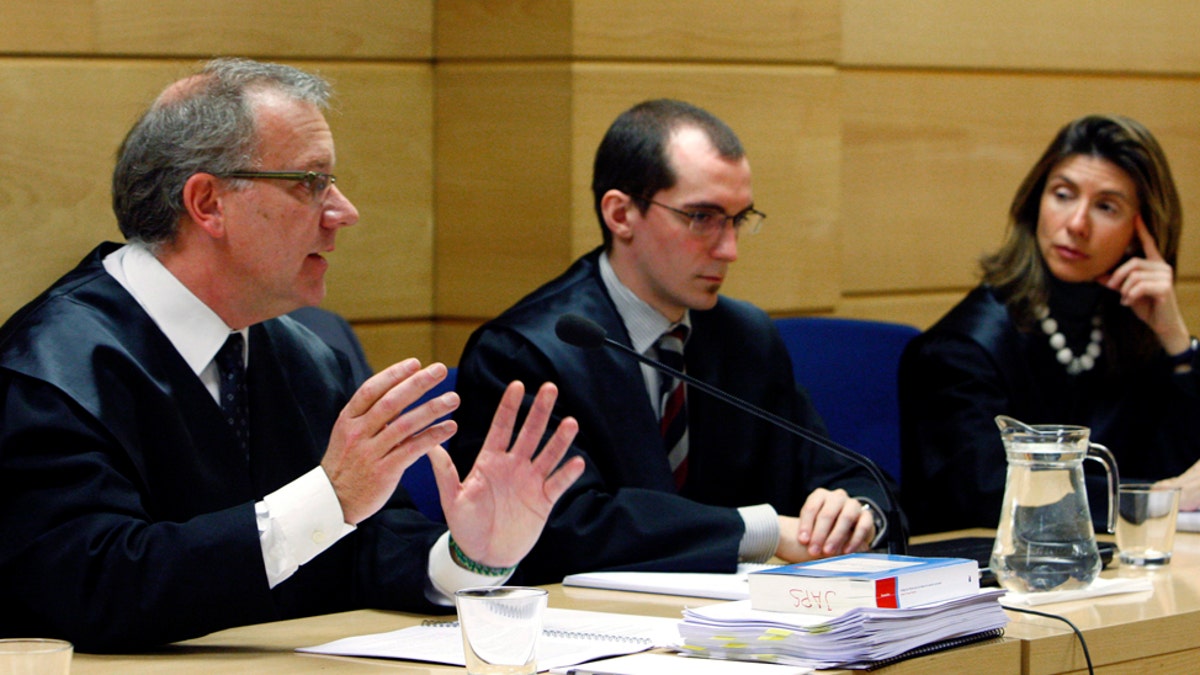
A lawyer for Google, Javier Aparicio, left speaks in court in Madrid Wednesday Jan. 19. 2011. Lawyers for Google are appealing demands by Spanish authorities that the Internet search giant delete links to web sites containing information that officials say violate Spaniards' privacy rights. Spain's Data Protection Agency says it went after Google on request of the individuals involved and because the original publishers of the links cannot legally be ordered to take them down. (AP Photo, Gustavo Cuevas, Pool)
Imagine, you're a surgeon who was absolved of charges of criminal negligence in a 20-year-old case. But every time you type your name in Google, you see a Spanish newspaper reference to the original case — and not the acquittal..
That was among one of 90 complaints from Spaniards' against Google that forced the Internet company back to court Wednesday in Madrid. The company is appealing demands by Spanish authorities that the company delete links to websites containing information that officials claim violates Spaniards' privacy rights.
Google Inc. says it's the first case of its kind — and that a Spanish decision mandating the deletion of links could impinge on freedom of expression.
Spain's Data Protection Agency said it filed the orders against Google at the request of individuals who lodged complaints, and because the original publishers of the material cannot legally be ordered to take them down.
The National Court on Wednesday heard arguments from both sides on the first five orders to be appealed.
Another case involved a woman who was denied a local government grant years ago, but references to the case and data about her keep appearing in searches using her name.
Google's chief argument is that it is just an intermediary and that the original publishers are responsible for the content.
Google fears that a ruling against them by the court would effectively give the U.S. search engine giant publisher status and make it accountable for the material it provides on the Internet.
"We are disappointed by the actions of the Spanish privacy regulator. Spanish and European law rightly hold the publisher of material responsible for its content," Peter Barron, Director of External Relations for Google, said prior to the hearing.
"Requiring intermediaries like search engines to censor material published by others would have a profound chilling effect on free expression without protecting people's privacy," he said.
The five cases involved information published in newspapers or official gazettes.
Jose Antonio Perales, a lawyer for the data protection agency, said each of the five individuals claimed their dignity and privacy were affected by the fact that references to past events involving them continued to appear in Internet searches.
"We face a violation of fundamental rights," said Gabriel Gomez, a lawyer acting on behalf of the surgeon. "The Internet can't be a refuge for insults, threats or offenses."
But lawyers for Google pointed out that the data agency had not called on any of the news providers to modify or remove their content. They argued there are Internet tools available so that newspapers could block search engines from indexing certain material.
They also pointed out that Google had blocked information when it was shown to be criminal, such as child pornography sites.
"All the sentences (in other countries) under which Google has de-indexed pages are sentences which declared the content illegal," said Google lawyer Javier Aparicio, arguing that the material in the Spanish cases was not illegal.
A ruling by the National Court could take weeks, even months.
The case is the latest legal wrangle involving Google. Google's street mapping program has been dogged by privacy concerns in Europe since its launch, and authorities across the world have mounted probes into the tech company's practices.
There has been an ongoing debate over online privacy and the so-called "right to be forgotten," the proposal that would require websites to delete all information about a person at their request. European Union officials have been looking for ways to allow citizens to delete information about themselves that they do not wish to appear on the Internet.
Based on reporting by the Associated Press.
Follow us on twitter.com/foxnewslatino
Like us at facebook.com/foxnewslatino







































